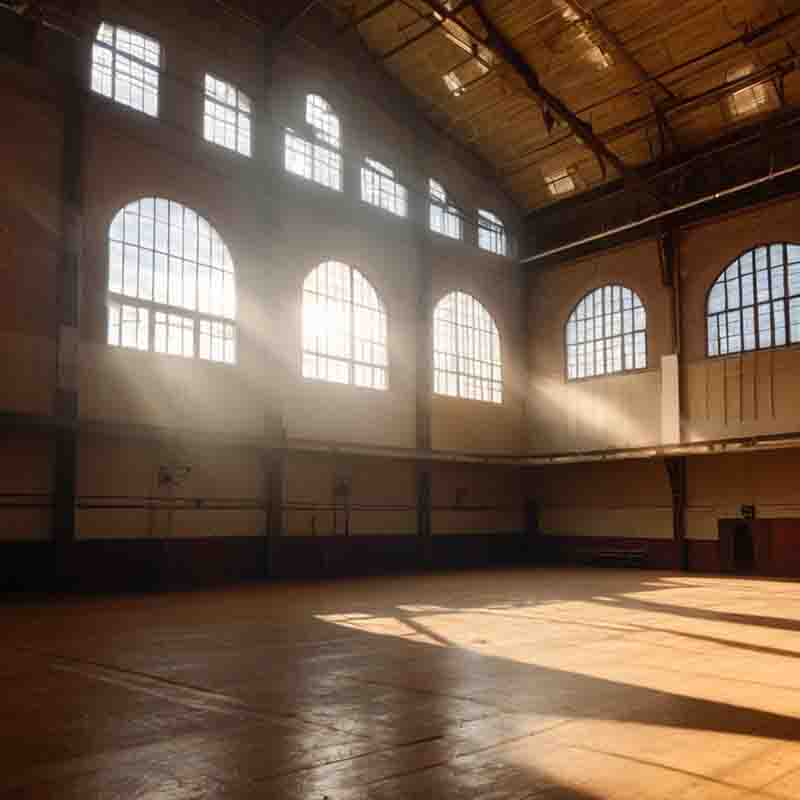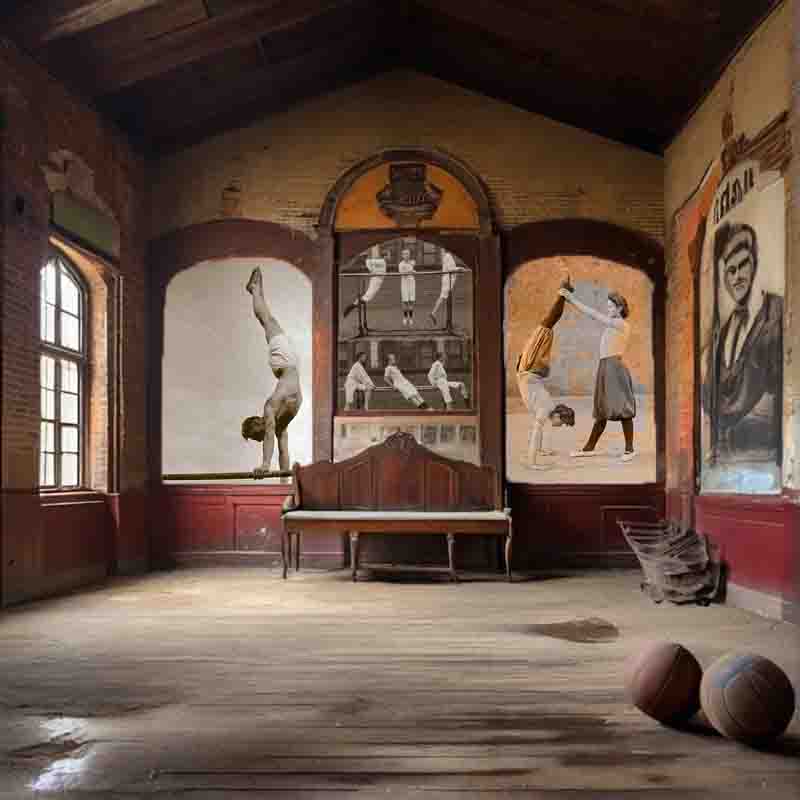Turners' Blueprint for Maintaining Fitness
Turners, also known as members of German-American Turnvereine, have been passionately active in shaping athletics, gymnastics, and educational programmes in the United States.

Founded by German immigrants, they weren't just about fitness (though gymnastics was a big part!). They championed education, democracy, and a distinct German-American identity.
German gymnastic societies, commonly known as Turnvereine, played a pivotal role in promoting physical fitness, cultural identity, and social cohesion among German American communities.
Turners engaged in gymnastics, emphasizing holistic well-being through a combination of physical exercise, intellectual development, and community involvement.
Over time, Turners evolved into multifaceted organizations, contributing significantly to the cultural fabric and communal life of German Americans in the U.S..
The term "Turner" itself is derived from the German word "Turnen," which translates to gymnastics or physical exercise.
Gymnastics clubs played an important role in cultivating a sense of community and promoting cultural ties among German immigrants in the United States.
These gymnastic societies were not merely centered around physical activities; rather, they encompassed a broader philosophy that emphasized the holistic development of individuals—both physically and intellectually.
Turners sought to cultivate a balance between mind and body through gymnastics, intellectual pursuits, and civic engagement.
Turners, in a historical context, refer to members of German gymnastic societies that emerged in the early 19th century. These clubs, known collectively as Turnvereine, were established with the primary goal of promoting physical fitness, cultural identity and social unity within German-American communities.
One notable aspect of the Turnvereine was their commitment to physical fitness and the promotion of a healthy lifestyle.
Gymnastics routines, calisthenics, and other exercises were integral components of Turner gatherings.
Beyond the physical aspect, Turners were also involved in educational and cultural activities, reflecting a commitment to intellectual development and the preservation of German heritage.
Turners Timeline
Originating in Germany, Turners trace their legacy to Friedrich Ludwig Jahn, known as the "Father of Gymnastics," who, in 1811, established the first Turnplatz, or open-air gymnasium.
As German immigrants flocked to the United States during the mid-1800s, they brought with them the ethos of Turners.
| Year | Milestone |
|---|---|
| 1811 | Friedrich Ludwig Jahn, known as the "Father of Gymnastics," opens the first Turnplatz in Germany. |
| 1848 | German revolutions lead to increased migration to the United States, bringing Turners to America. |
| 1850 | Turnvereine, or gymnastic societies, are established in major U.S. cities to serve German immigrants. |
| 1861-1865 | Turners actively participate in the American Civil War, contributing to both Union and Confederate forces. |
| 1870 | National Turnverein is founded, uniting various local Turnvereine and providing a centralized organization. |
| 1880s-1890s | Turners become influential in the labor movement and advocate for workers' rights and social reform. |
| 1903 | A split occurs in the American Turnerbund over political and ideological differences. |
| 1917-1918 | During World War I, Turners face anti-German sentiment, leading to restrictions and challenges. |
| 1936 | Turners in the U.S. decline due to both internal divisions and the impact of the Great Depression. |
| 1950s | Turners experience a revival as interest in physical fitness increases in the post-war era. |
| 1970s-1980s | Turners evolve to include a broader range of activities beyond gymnastics, adapting to changing interests. |
| 2000s | Turners continue to serve as cultural hubs, preserving German heritage and fostering community engagement. |
| Present | Turners maintain a presence, with some societies adapting to contemporary fitness trends while preserving cultural traditions. |
This timeline provides key events in the history of Turners, highlighting their evolution from gymnastic societies for German immigrants to multifaceted organizations with a lasting impact on both physical fitness and cultural heritage in the United States.
Gymnastics and Heritage: Explore the World of Turners

The Turners evolved into eclectic organisations that contributed significantly to the fabric of German-American culture in the United States. They organised events, celebrations and educational programmes and became hubs for social interaction and the exchange of ideas.
Fit for Legacy: A German-American Experience
Turners trace their historical roots to early 19th-century Germany, a time marked by political and social upheaval.
The gymnastic movement, founded by Friedrich Ludwig Jahn, gave rise to Turnvereine, gymnastic societies aimed at promoting physical fitness, intellectual development, and civic engagement.
The founding principles were deeply intertwined with the democratic ideals of the time, seeking to empower individuals through a holistic approach to personal growth.
The gymnastic exercises performed by Turners reflected not only a commitment to physical well-being but also a form of cultural expression, as they were often infused with traditional German elements.
Turners in the United States
As German immigrants seeking a new beginning in the United States, the Turners played a key role in preserving their cultural identity while adapting to the realities of a new country.
Turnvereine were established across the country, becoming hubs for German-American communities.
The societies faced challenges during the American Civil War, with divisions arising among members who aligned with either the Union or Confederate causes.
Despite these challenges, Turners continued to endure and evolve, contributing significantly to the integration of German immigrants into American society.
Gymnastics and Physical Fitness

Turners' gymnastic practices emphasize tradition and evolution, promoting physical fitness and mental well-being.
The cornerstone of Turners' philosophy lies in the significance of gymnastics as a means of promoting physical fitness.
Traditional German gymnastic exercises, known for their focus on flexibility, strength, and coordination, became integral to Turners' practices.
Over time, gymnastics within Turners evolved, incorporating a broader range of athletic activities to cater to changing preferences and societal trends.
The commitment to physical fitness remains a central tenet, emphasizing a holistic approach to well-being that goes beyond conventional exercise routines.
Cultural Identity and Heritage Preservation
Turners actively contribute to the preservation and celebration of cultural heritage by incorporating German elements into their gymnastic routines.
The performances often showcase traditional German dances, music, and attire, providing a tangible link to the cultural roots of their members.
Beyond gymnastics, Turners engage in celebrating German festivals and traditions, creating an immersive cultural experience.
Initiatives such as language preservation and cultural education programs further underline their dedication to fostering a strong sense of cultural identity.
Challenges and Resilience
Turners have faced various challenges throughout their history, including suppression during World Wars and divisions within the societies.
The anti-German sentiment during wartime led to restrictions on gymnastic activities and cultural expressions.
Despite these challenges, Turners showcased remarkable resilience, adapting to changing demographics, societal norms, and financial struggles.
The support of their communities played a decisive factor in overcoming these challenges, demonstrating the resilient spirit that has defined the Turners over the years.
Contemporary Role of Turners
In contemporary times, Turners remain dynamic cultural contributors, embracing inclusive programming and modern technology.
Cultural events and festivals organized by Turners reflect a commitment to diversity, ensuring that their activities resonate with a broad membership.
The utilization of digital platforms for engagement and educational initiatives speaks to their adaptability to modern trends.
Turners continue to be relevant cultural institutions, fostering understanding and appreciation for German heritage in an ever-changing world.
Community Engagement and Events
Turners actively participate in cultural events, festivals, and community engagement initiatives.
Their involvement goes beyond gymnastic performances, extending to collaborations with local cultural institutions and the hosting of cultural heritage days.
By actively engaging with the community, Turners contribute to the broader cultural tapestry, promoting understanding and appreciation for German heritage among a diverse audience.
Gymnastics Beyond Physical Exercise
Gymnastics within Turners offers more than just physical exercise; it provides mental agility, stress reduction, and a sense of achievement.
The precision and focus required in gymnastic activities contribute to mental agility and cognitive benefits.
Additionally, the rhythmic nature of gymnastics serves as a meditative outlet, reducing stress and promoting emotional well-being.
Achieving milestones in gymnastics routines fosters a sense of accomplishment and goal-setting, contributing to overall mental well-being.
Turners' Contribution to Well-Being
Turners contribute significantly to the overall well-being of their members.
The emphasis on physical fitness enhances not only physical health but also mental well-being through the cognitive challenges posed by gymnastics.
Social connection and community engagement within Turners create a supportive environment, fostering a sense of belonging and emotional fulfillment.
The preservation of cultural identity adds a unique layer to the well-being fostered within Turners, creating a holistic and integrated approach to personal growth.
Celebrating Achievements and Milestones
Turners actively celebrate both historical and contemporary achievements, reinforcing a sense of cultural pride and identity.
Recognising achievements within the group and the wider German-American community provides a way of acknowledging the Turners' contribution to the larger collective.
This commemoration is a tribute to the everlasting legacy of the Turners and their sustained commitment to influencing cultural memory.
Turners, with their rich historical roots, continue to be cultural stewards in the modern era.
From their origins in Germany to their adaptation in the United States, Turners have navigated challenges, embraced resilience, and evolved while remaining true to their core principles.
The Turners' many contributions to physical fitness, cultural identity, and overall well-being underscore their enduring significance in German-American history.
-
Turnvereine: The term "Turnvereine" refers to German gymnastic societies or clubs that emerged in the early 19th century. These organizations played a pivotal role in fostering a sense of community, physical well-being, and cultural identity among German immigrants in the United States.
-
Gymnastic Societies: Gymnastic societies, particularly the Turnvereine, were founded on the principles of gymnastics as a means of promoting overall health and well-being. The gymnastic routines performed by Turners included calisthenics, apparatus exercises, and other physical activities aimed at enhancing strength, flexibility, and coordination.
-
Physical Fitness: At the core of the Turner movement was a commitment to physical fitness. Gymnastic exercises, group workouts, and athletic competitions were central to Turners' activities.
-
Cultural Identity: Turners played a significant role in shaping and preserving the cultural identity of German Americans. Through gymnastics, educational programs, and social events, Turnvereine contributed to the retention of German language, traditions, and customs.
-
Turner Philosophy: The Turner philosophy was a comprehensive approach to personal development that integrated physical fitness, intellectual pursuits, and civic engagement. It emphasized a holistic understanding of human well-being, recognizing the interconnectedness of physical and mental health.
-
Holistic Development: Turners believed in the importance of holistic development, addressing both the physical and intellectual aspects of an individual. The holistic approach sought to create well-rounded individuals who were not only physically fit but also intellectually curious and socially engaged.
-
Mind-Body Balance: Central to the Turner philosophy was the idea of achieving a balance between the mind and body. While physical fitness was a primary focus, intellectual pursuits were equally valued. urners aimed to create an equilibrium where mental and physical well-being complemented each other, fostering a more complete and harmonious individual.
-
Civic Engagement: Turners were actively involved in civic engagement, contributing to the communities in which they resided. Beyond gymnastics, Turnvereine organized events, educational programs, and cultural celebrations that benefited not only their members but also the broader society.
-
Healthy Lifestyle: Turners advocated for a healthy lifestyle that extended beyond the gymnasium. This included promoting good nutrition, hygiene, and overall well-being. The idea was to cultivate habits that supported a robust and balanced life, aligning with the holistic approach to personal development inherent in the Turner philosophy.
-
Cultural Preservation: Turners played a vital role in preserving German culture among immigrant communities. Through language classes, cultural events, and celebrations, Turnvereine became bastions of German heritage in the United States.
-
Historical Legacy: The legacy of Turners is deeply embedded in the historical narrative of German Americans in the United States. Their contributions to physical fitness, cultural preservation, and community engagement have left a lasting impact, shaping the social and cultural landscape of German American communities well into the present day.
The Turnvereine played a particularly prominent role in shaping the social and cultural landscape of German American communities in the 19th and early 20th centuries.
New World Gymnastics: German-American Heritage through Turnvereine
One notable aspect of the Turnvereine was their commitment to physical fitness and the promotion of a healthy lifestyle. Gymnastics routines, calisthenics, and other exercises were integral components of Turner gatherings.
The Turners' legacy remains as a marker of the permanent impact of these gymnastic societies on the cultural and social history of German Americans in the United States.
Their commitment to language, tradition and intellectual exploration became not only a source of identity for German Americans, but also a contribution to the vibrant mix of American culture.
The Turners: FAQ
Are you curious about music, art, technology, fashion, lifestyle, and beer?
If so, then you need to subscribe to the free Likewolf newsletter.
100% privacy. When you sign up, we'll keep you posted.
Balanced and Plentiful Options
German and American Cuisine Styles
